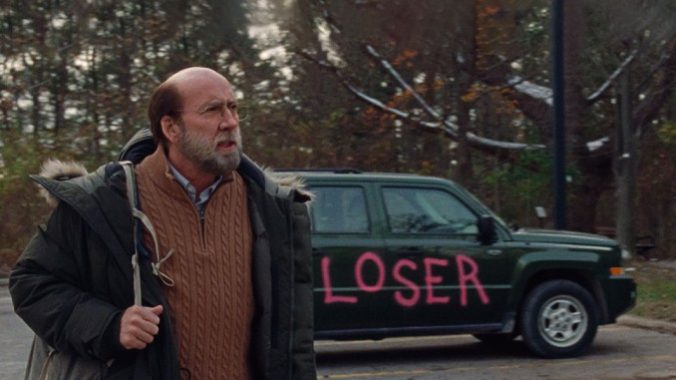Nicolas Cage Navigates a Nightmarish, Hilarious Dream Scenario

Norwegian-born, L.A.-based director Kristoffer Borgli has built his filmmaking career satirizing the way brands capitalize on the narcissistic impulses of young people. DRIB (2017) told the story of Borgli’s real life friend Amir, an absurdist performance artist who nearly scammed his way into becoming the face of a major energy drink. Borgli broke out earlier this year with Sick of Myself, a black comedy about a young woman so desperate for brand attention that she makes herself deathly ill. Dream Scenario marks Borgli’s first full English-language film, as well as his most ambitious film to date, in terms of budget, content and genre. In collaboration with Hereditary director Ari Aster, who helped produce Dream Scenario for A24, Borgli has expanded past straightforward black comedy and into surrealist horror-comedy.
Not only are narcissism and corporate shallowness in Borgli’s crosshairs, but he has also added “cancel culture” to the list. Nicolas Cage stars as Paul Matthews, a balding, tenured university biology professor so unremarkable that it’s almost impressive. His younger daughter Sophie (Lily Bird) has a strange dream where mysterious objects fall from the sky, she begins to levitate and her father just stands there, watching.
Inexplicably, everyone around him, including his students and even strangers, starts having a similar version of Sophie’s dream; some kind of disaster is taking place, and Paul stands there, doing nothing. An ex-girlfriend comes up to him after a play to tell him she had a dream about him, much to the chagrin of Paul’s lovely wife, Janet (Julianne Nicholson). At first, Paul’s already weak masculinity is bruised by the implication that he does nothing in the face of a crisis, but then the viral fame starts rolling in, and his ego is inflated tenfold. Janet is (rightly) skeptical of the whole thing, but she’s willing to stand by her man throughout the strange ordeal.
Since this is a Borgli picture, where there’s viral fame, there’s a brand deal. Paul is quickly contacted by an ad agency called “Thoughts?” run by Trent (Michael Cera doing a toned down version of Brett Gelman’s DRIB character) and his business partner, Mary (the always funny Kate Berlant). They think he’d be perfect to work on an ad campaign for Sprite, but Paul is more interested in using his viral fame to get his foot in the door of the publishing world, so he can finally publish his ant farm research, which is written only in his head. This does not go over well with the ad people.
In a rather convenient twist of fate, the only person in the world who is having sex dreams about Paul is the hot young ad agency intern Molly (a habitually underused Dylan Gelula). Molly’s sole motivation is that she wants to know if sex with Paul in real life is as great as it is in her dreams; a comically timed fart prevents them from taking things too far. When things turn sour for Paul later, it would make sense that his, albeit brief, affair with Molly would come back to bite him in the ass. Bewilderingly, Molly is absent from the rest of the narrative, which calls into question why her character was written in the first place, other than to provide titillation. There’s certainly nothing wrong with titillation, but Borgli’s inability to use sex to make a larger point left me with intellectual blue balls.
Unlike Borgli’s previous films, Dream Scenario is less about the art of the brand deal, and more about the swift loss of the brand deal, once Paul’s “dream scenario” shifts from a bizarre, but ultimately harmless phenomenon to a terrifying nightmare. Soon, Paul isn’t just a passive bystander in people’s dreams—he’s the perpetrator of unspeakable violence in their nightmares. Once again, Sophie’s subconscious is the canary in the coal mine: Hers is the first nightmare to feature Paul as a bloodthirsty killer. Sophie’s friends at school start calling her dad Freddy Kreuger, and he’s less welcome in public places. Soon, not only are his students skipping class, but they’re also calling on the university administration to fire him for the trauma he’s caused.
-

-

-

-

-

-

-

-

-

-

-

-

-

-

-

-

-

-

-

-

-

-

-

-

-

-

-

-

-

-

-

-

-

-

-

-

-

-

-

-








































